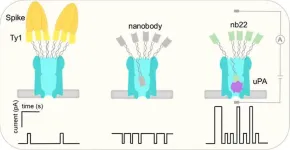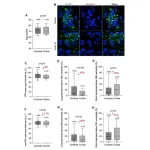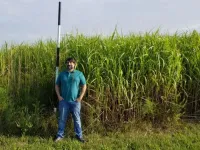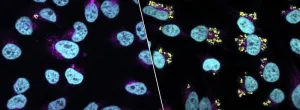(Press-News.org) For many materials critical to supply chains that will help enable America’s decarbonization transition, resources are limited. Traditional mining is fraught with challenges, so advancing clean energy depends on finding new ways to reliably access critical materials.
Promoting national security and economic competitiveness will require America’s researchers to find new ways to obtain the materials that we need for many technologies. These include batteries, magnets in electric motors, catalysts, nuclear reactors and other essential carbon-free energy technologies.
Water represents one underexplored avenue of acquiring these materials. Scientists at the U.S. Department of Energy’s Argonne National Laboratory have recently published a comprehensive review detailing the various mechanisms by which critical materials can be extracted from diverse water streams.
Different types of water offer different kinds of material resources, said Seth Darling, chief science and technology officer for Argonne’s Advanced Energy Technologies directorate. “The oceans are such a tremendous resource because the total quantities of many valuable and important materials are vast, but they are also highly dilute,” he said. “Wastewater has also been in need of reframing — we want people to see that wastewater is not truly waste, rather, it’s rich with all sorts of valuable stuff.”
Darling also pointed to groundwater aquifers and geothermal brines as other possible sources of valuable materials. These materials include lithium, which is increasingly in demand for electric vehicle batteries and could be used to help decarbonize our economy. “Lithium is in the ocean and in geothermal brines; you’d extract it differently from these two sources but it’s important to understand which is cheapest, has the smallest environmental impact, and enables secure supply chains,” Darling said. “For many other materials, water is underexplored as a source, and that’s something we’re paying increasingly more attention to.”
The technologies that Darling and his colleagues are exploring to extract critical materials from different types of water range from the traditional (like membranes) to the innovative (like interfacial solar steam generators).
Omar Kazi, a Ph.D. student in molecular engineering at the University of Chicago working with Darling, is studying methods to concentrate wastewater streams to recover valuable materials. “Getting rid of the water through evaporation is an energy-intensive and slow process,” Kazi said. “In geothermal brines, it can take years for water to evaporate to be able to recover the lithium that’s contained in them, which creates a huge bottleneck. The question we are asking is ‘how we can make the water evaporate faster?’”
One way to do that could be through the use of porous photothermal materials, which convert light to heat efficiently. These light absorbers act like a black T-shirt that heats up on a sunny day. That heat is transferred to the water directly at the interface with the surrounding air, significantly accelerating evaporation.
Overall, Darling noted, Argonne has rich capabilities in supply chain, life cycle and technoeconomic analyses. In addition, the laboratory specializes in the materials, chemistry and process engineering relevant to critical material extraction. This uniquely positions the lab to help achieve a more secure and circular economy of materials, especially when it comes to getting more out of water streams.
A paper based on the study, “Material design strategies for recovery of critical resources from water,” appeared online in Advanced Materials on March 31.
In addition to Darling and Kazi, other authors of the study include Argonne’s Wen Chen, Jamila Eatman, Feng Gao, Yining Liu, Yuqin Wang, and Zijing Xia.
This work was supported as part of the Advanced Materials for Energy-Water Systems (AMEWS) Center, an Energy Frontier Research Center funded by the U.S. Department of Energy, Office of Science, Basic Energy Sciences at Argonne National Laboratory.
Argonne National Laboratory seeks solutions to pressing national problems in science and technology. The nation’s first national laboratory, Argonne conducts leading-edge basic and applied scientific research in virtually every scientific discipline. Argonne researchers work closely with researchers from hundreds of companies, universities, and federal, state and municipal agencies to help them solve their specific problems, advance America’s scientific leadership and prepare the nation for a better future. With employees from more than 60 nations, Argonne is managed by UChicago Argonne, LLC for the U.S. Department of Energy’s Office of Science.
The U.S. Department of Energy’s Office of Science is the single largest supporter of basic research in the physical sciences in the United States and is working to address some of the most pressing challenges of our time. For more information, visit https://energy.gov/science.
END
To boost supply chains, scientists are looking at ways to recover valuable materials from water
From the oceans to geothermal brines, water is an underexplored resource for providing various materials
2023-06-15
ELSE PRESS RELEASES FROM THIS DATE:
Tiny nanopores can contribute to faster identification of diseases
2023-06-15
In a collaboration with Groningen University, Professor Jørgen Kjems and his research group at Aarhus University have achieved a remarkable breakthrough in developing tiny nano-sized pores that can contribute to better possibilities for, among other things, detecting diseases at an earlier stage. Their work, recently published in the scientific journal ACS Nano, shows a new innovative method for finding specific proteins in complex biological fluids, such as blood, without having to label the proteins chemically. The research is an important milestone in nanopore technology, and could revolutionise medical diagnostics.
Nanopores are ...
Healthy sex life during pandemic tied to an array of sexual coping strategies
2023-06-15
CHAMPAIGN, Ill. — New research suggests that people who maintained healthy sexual and intimate lives early in the pandemic used sex as a coping mechanism to enhance their relationship with their partners, explore new sexual activities and in an array of other ways to adapt to the restrictions, stress and the changes in their daily lives.
One year into the pandemic, Liza Berdychevsky, a professor of recreation, sport and tourism at the University of Illinois Urbana-Champaign, conducted an online survey of 675 people to explore the differences between people whose sex lives had fizzled and those whose sex lives had flourished. The sample ...
Short telomeres in alveolar type II cells associate with lung fibrosis in post COVID-19 patients with cancer
2023-06-15
“[...] here we reveal a link between short telomere length in ATII cells and post-viral lung fibrosis outcome in post-COVID-19 patients.”
BUFFALO, NY- June 15, 2023 – A new research paper was published on the cover of Aging (listed by MEDLINE/PubMed as "Aging (Albany NY)" and "Aging-US" by Web of Science) Volume 15, Issue 11, entitled, “Short telomeres in alveolar type II cells associate with lung fibrosis in post COVID-19 patients with cancer.”
The severe acute respiratory syndrome coronavirus 2 (SARS-CoV-2) is responsible for the coronavirus disease 2019 (COVID-19) pandemic. The severity of COVID-19 increases with each decade of life, ...
Legal recreational cannabis use and binge drinking is on the rise for older adults
2023-06-15
June 15, 2023 --New research at Columbia University Mailman School of Public Health examined changes in binge drinking after the implementation of recreational cannabis laws.
Analysis of national survey data from Americans aged 12 and older showed that past-month binge drinking increased overall among people aged 31 and over from 2008 to 2019. At the same time, binge drinking declined overall among people aged 12-30. The results are published online in the International Journal of Drug Policy.
The most substantial declines in binge drinking were observed ...
New study gives clues on why exercise helps with inflammation
2023-06-15
TORONTO, CANADA, June 15, 2023 - Researchers have long known that moderate exercise has a beneficial impact on the body’s response to inflammation, but what’s been less understood is why. New research coming out of York University done on a mouse model suggests that the answers may lie at the production level of macrophages — white blood cells responsible for killing off infections, healing injury and otherwise acting as first responders in the body.
“Much like if you train your muscles through ...
Climate change likely led to violence in early Andean populations
2023-06-15
Climate change in current times has created problems for humans such as wildfires and reduced growing seasons for staple crops, spilling over into economic effects. Many researchers predict, and have observed in published literature, an increase in interpersonal violence and homicides when temperatures increase.
Violence during climatic change has evidence in history. University of California, Davis, researchers said they have have found a pattern of increased violence during climatic change in the south central Andes between A.D. 470 and 1500. During that time, which includes the Medieval Climatic ...
Carbon mitigation payments can make bioenergy crops more appealing for farmers
2023-06-15
URBANA, Ill. — Bioenergy crops such as miscanthus and switchgrass provide several environmental benefits, but low returns and profit risks are barriers for investment by farmers. A new study from the University of Illinois Urbana-Champaign shows that carbon mitigation payments could increase net returns and reduce income risk, potentially enticing more farmers to grow these crops.
“We were interested in looking at the returns to farmers and the risks to farm income of adopting bioenergy crops compared to conventional corn and soybean crops. We ...
Grant awarded to investigate antifungal therapies in Crohn’s patients
2023-06-15
Dr. Iliyan D. Iliev, an associate professor of immunology in medicine in the Division of Gastroenterology and Hepatology, co-director of the Microbiome Core and a member of the Jill Roberts Institute for Research in Inflammatory Bowel Disease (IBD) at Weill Cornell Medicine, is the lead investigator on a grant to Weill Cornell Medicine from The Leona M. and Harry B. Helmsley Charitable Trust to target pathogenic fungi in patients with Crohn’s disease.
Dr. Iliev teamed up with Dr. Randy Longman, ...
FAMU-FSU College of Engineering researchers want drivers to see clearly on the road
2023-06-15
Every year, sun glare contributes to around 3,000 crashes in the United States. FAMU-FSU College of Engineering researchers are helping to mitigate this problem by examining what drivers are likely to do when faced with sun glare. Their work was published in Transportation Research Record.
“We want drivers to be safer on the road,” said study co-author Eren Ozguven, director of the Resilient Infrastructure and Disaster Response Center. “At certain times of day, the sun can be blinding, so as scientists and engineers, we want to find solutions.”
The first step is to understand where problems are most likely to occur. ...
Scientists discover how Golden staph hides and thrives in human cells using state-of-the-art research tool
2023-06-15
Nearly one in three people globally unknowingly carries Golden staph, or Staphylococcus aureus, in their nose or on their skin. While the bacterium is harmless to most, it can lead to serious infection and even death if it enters the bloodstream through a cut, surgical wound or catheter.
The major breakthrough, led by the University of Melbourne’s Dr Abdou Hachani, a Senior Researcher at the Peter Doherty Institute for Infection and Immunity (Doherty Institute), published in the online medical journal eLife, was made possible by a new state-of-the-art ...
LAST 30 PRESS RELEASES:
Scientists show how to predict world’s deadly scorpion hotspots
ASU researchers to lead AAAS panel on water insecurity in the United States
ASU professor Anne Stone to present at AAAS Conference in Phoenix on ancient origins of modern disease
Proposals for exploring viruses and skin as the next experimental quantum frontiers share US$30,000 science award
ASU researchers showcase scalable tech solutions for older adults living alone with cognitive decline at AAAS 2026
Scientists identify smooth regional trends in fruit fly survival strategies
Antipathy toward snakes? Your parents likely talked you into that at an early age
Sylvester Cancer Tip Sheet for Feb. 2026
Online exposure to medical misinformation concentrated among older adults
Telehealth improves access to genetic services for adult survivors of childhood cancers
Outdated mortality benchmarks risk missing early signs of famine and delay recognizing mass starvation
Newly discovered bacterium converts carbon dioxide into chemicals using electricity
Flipping and reversing mini-proteins could improve disease treatment
Scientists reveal major hidden source of atmospheric nitrogen pollution in fragile lake basin
Biochar emerges as a powerful tool for soil carbon neutrality and climate mitigation
Tiny cell messengers show big promise for safer protein and gene delivery
AMS releases statement regarding the decision to rescind EPA’s 2009 Endangerment Finding
Parents’ alcohol and drug use influences their children’s consumption, research shows
Modular assembly of chiral nitrogen-bridged rings achieved by palladium-catalyzed diastereoselective and enantioselective cascade cyclization reactions
Promoting civic engagement
AMS Science Preview: Hurricane slowdown, school snow days
Deforestation in the Amazon raises the surface temperature by 3 °C during the dry season
Model more accurately maps the impact of frost on corn crops
How did humans develop sharp vision? Lab-grown retinas show likely answer
Sour grapes? Taste, experience of sour foods depends on individual consumer
At AAAS, professor Krystal Tsosie argues the future of science must be Indigenous-led
From the lab to the living room: Decoding Parkinson’s patients movements in the real world
Research advances in porous materials, as highlighted in the 2025 Nobel Prize in Chemistry
Sally C. Morton, executive vice president of ASU Knowledge Enterprise, presents a bold and practical framework for moving research from discovery to real-world impact
Biochemical parameters in patients with diabetic nephropathy versus individuals with diabetes alone, non-diabetic nephropathy, and healthy controls
[Press-News.org] To boost supply chains, scientists are looking at ways to recover valuable materials from waterFrom the oceans to geothermal brines, water is an underexplored resource for providing various materials





